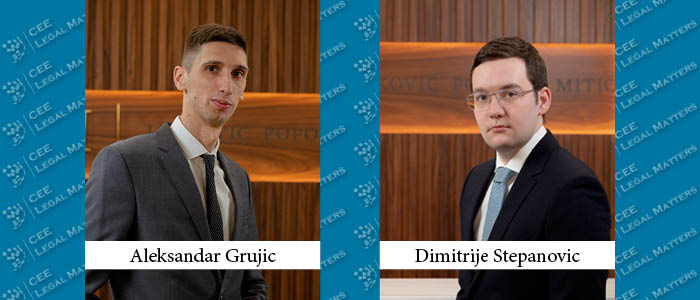In the probate proceedings, the court determines who the heirs of the decedent are, which property makes up his estate, and which rights from the estate belong to heirs, legatees, and other persons.
If a foreign element exists on the side of a deceased, it is necessary to determine which substantial law will be applied and which court will have jurisdiction. The foreign element on the side of a deceased exists if the deceased was a foreign citizen or if he was a Serbian citizen who had an immovable or movable estate outside of Serbia at the time of death.
The probate proceedings in Serbia are regulated by the provisions of the Inheritance Act and by the provisions of the Law on Non-Contentious Proceedings. When it comes to the jurisdiction of Serbian courts for the probate proceedings with a foreign element, the rules are stipulated also in the Law on Resolving Conflict of Laws with Regulations of other Countries. Here we will say something more about the jurisdiction of the Serbian courts in probate proceedings with a foreign element.
Institution of the proceedings
The probate proceedings shall be instituted ex officio as soon as the court becomes aware that a person has died or has been declared dead. Having in mind said, if the deceased was a citizen of Serbia, probate proceedings should be instituted ex officio as soon as the competent court is informed by the Registrar that a person is deceased.
The Registrar often omits to inform the court about one’s death. In that case, the heirs of a deceased should submit the motion on probate proceedings to the competent court. After that, it is up to the probate court to decide whether the proceedings will be continued and finished before the court or before the notary public. Usually, the court appoints the case to the notary public, unless there is an explicit and justified request from the heirs that the proceedings be conducted before the court.
However, the motion to the court is always necessary if the deceased was a foreign citizen or a person without citizenship. The probate proceedings before Serbian courts are being conducted in Serbian language, so the motion must be in Serbian language also. Also, if the deceased was a foreign citizen the court itself would be obliged by the law to conduct proceedings and could not appoint the case to the notary public.
Jurisdiction of the Serbian courts
The Basic courts are first-instance courts competent for the subject matter of probate proceedings in Serbia. There are 67 Basic courts in Serbia in total. Most Basic courts have only one probate judge who is competent for the probate proceedings and very few court personnel for this matter. This is due to the fact that the courts usually appoint notaries public to conduct regular probate proceedings (probate proceedings without a foreign element) and there are only a few cases with a foreign element.
A general rule for the probate proceedings is that the court on whose territory the testator had a permanent or temporary residence at the time of death shall have territorial jurisdiction. If the testator at the time of death did not have either a permanent or temporary residence in the territory of the Republic of Serbia, the court in whose territory the prevailing part of his estate is located shall be the court of competent jurisdiction.
Having in mind all said, territorial jurisdiction is established firstly based on the fact of permanent/temporary residence of the testator in Serbia and secondly on the location of the prevailing part of his estate. If the location of the prevailing part of the testator’s estate is not possible to determine, any court in whose territory some part of the estate is located could be the court of competent jurisdiction.
If there is no other way to determine which court would be the territorially competent court, then the Supreme Court of Serbia is authorized to determine which Basic court will be the competent one.
A court of the Republic of Serbia shall have exclusive jurisdiction to hear cases relating to immovable estate situated in the Republic of Serbia. If the court of some other country would hear the case and determine the heirs relating to the immovable estate of a deceased in Serbia, the decision of the foreign court would not be suitable for recognition in Serbia and Serbian authorities would not recognize it.
If the immovable estate of Serbian citizens is situated abroad (in a foreign state), a court of the Republic of Serbia shall have jurisdiction only if the authorities of the country in which the immovable property is situated do not have jurisdiction under the law of that country.
A court of the Republic of Serbia shall have jurisdiction to hear cases relating to the movable estate of Serbian citizens if the movable property is situated within the territory of Serbia or if a foreign authority does not have jurisdiction under the law of the country in which the property is situated or has declined jurisdiction. Also, a court of the Republic of Serbia shall have jurisdiction to hear cases concerning the movable estate of a foreign national that is situated in the Republic of Serbia, unless the court in the country of the deceased has no jurisdiction to hear cases relating to the movable property of Serbian nationals.
A court of the Republic of Serbia shall have exclusive jurisdiction to hear cases on the movable estate of a person without nationality, a person whose nationality cannot be established, or a person who has been granted refugee status if the movable property is situated in Serbia or if the deceased was permanently resident in Serbia at the time of death. However, if the deceased was not permanently resident in Serbia, the provisions governing deciding on the estate of a foreign national shall apply as appropriate, while a foreign state shall be understood to mean the state in which the deceased was permanently resident at the time of death.
When a court of the Republic of Serbia has no jurisdiction to hear cases on the estate of a foreign national, it may nevertheless order measures to secure the estate and protect the rights of the estate which is situated in Serbia.
Conclusion
When it comes to immovable estates situated in Serbia, the jurisdiction of the Serbian court in probate proceedings always exists and it is always an exclusive jurisdiction, even if the deceased was a foreign citizen. However, when it comes to movable estate, the jurisdiction of the Serbian courts exists only for specific cases.
Probate proceedings with a foreign element are usually a challenge for the courts and usually last longer than regular probate proceedings. So, if the heirs address the motion to the wrong court, it could lead to even longer proceedings which could be measured in years. By engaging a competent law office in Serbia, one can save a lot of time and avoid often costly and unnecessary trips to Serbia.
By Aleksandar Grujic, Senior Associate, and Dimitrije Stepanovic, Associate, JPM & Partners


